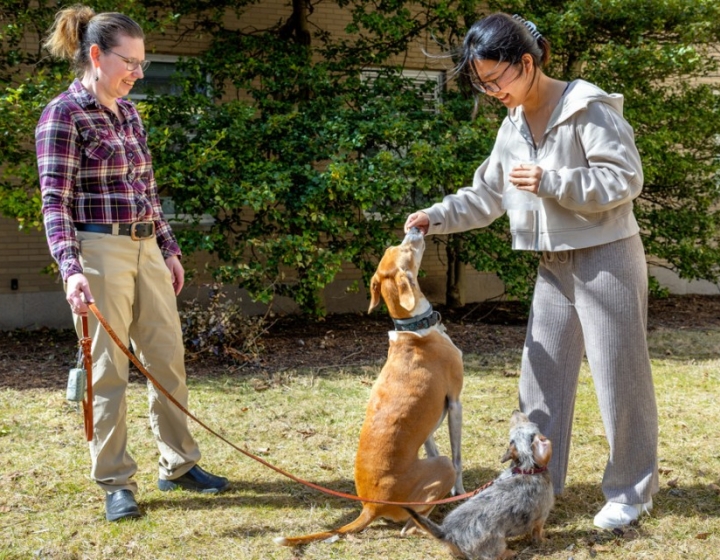Life lessons and lab benches
 Cornell graduate student Chavez Carter is a product of his environment, knowing best what he has been exposed to. Growing up, he looked forward to a career as a physical education teacher, a choice that would have allowed him to follow in his father’s footsteps. Like many in his Mississippi hometown, Carter’s professional options seemed limited to teaching, healthcare, and a few service-related industries. Today, with new experiences under his Cornell lab coat and coaching from mentor Dr. Avery August, Carter is contemplating a career in industrial research and development, with aspirations to develop life-saving drugs that will help those suffering from asthma and other conditions caused by inflamed airways.
Cornell graduate student Chavez Carter is a product of his environment, knowing best what he has been exposed to. Growing up, he looked forward to a career as a physical education teacher, a choice that would have allowed him to follow in his father’s footsteps. Like many in his Mississippi hometown, Carter’s professional options seemed limited to teaching, healthcare, and a few service-related industries. Today, with new experiences under his Cornell lab coat and coaching from mentor Dr. Avery August, Carter is contemplating a career in industrial research and development, with aspirations to develop life-saving drugs that will help those suffering from asthma and other conditions caused by inflamed airways.
“Even if your start isn’t particularly encouraging or promising, with a little luck and a lot of prayer, you can walk into a really great future,” said Carter, who is enrolled in Cornell’s Biological and Biomedical Sciences graduate education program. “I grew up in a small town, attended a small school, was surrounded by limited opportunities, and transferred in the middle of a doctoral program. My 10-year high school reunion is coming up. If someone had told me I’d be at Cornell working on my PhD, I’d have told them ‘no way.’ It just wasn’t in my scope. I didn’t know people who looked like me and had a PhD.”
Perceptions, though, can be deceiving. For instance, when Carter came to Cornell to complete a doctorate in immunology, he believed that Cornell might frown on his tendency to balance work and play. So he buried himself in research – and, he says, nearly lost an important part of his personality.
“Science can be a solo sport,” said Carter, who holds a bachelor’s and master’s degree from Alcorn State University and was the inaugural student in the Alcorn State/Penn State Bridges to the Doctorate Program. “But it’s only half of who I am. I’m a very social person, and I needed to find ways to meet my need to interact and engage with people.”
Luckily, Carter believes that where we start isn’t really important. Sometimes, he says, it’s not even where we finish. It’s the process of moving in the right direction that matters most.
“I had some perceptions about Cornell that were not accurate and led me down the wrong path,” said Carter. “It took a while for me to adjust. When I came to Cornell, I gave up what had worked for me for two degrees, two schools, my whole life. It only worked for so long, because it was the opposite of who I am.”
To turn the situation around, Carter decided to engage. Today, you’re just as likely to find him conducting research in the lab as you are to find him presiding over a meeting of the Black Graduate Student Professional Association. He was part of the team who founded Cornell’s First Annual Renaissance Ball: A Harmonious Chord of Diversity, an evening of dinner and dining, that was sponsored by a partnership of graduate and professional organizations who had never before collaborated on a joint project. (http://www.gradschool.cornell.edu/spotlight/first-annual-renaissance-ball-chord-diversity) He has also joined a local church and is once again playing his saxophone.
“I had made Cornell out to be something it didn’t have to be,” said Carter. “Our number one priority has to be our happiness, because it’s directly related to our productivity. We need to be true to who we are.”




